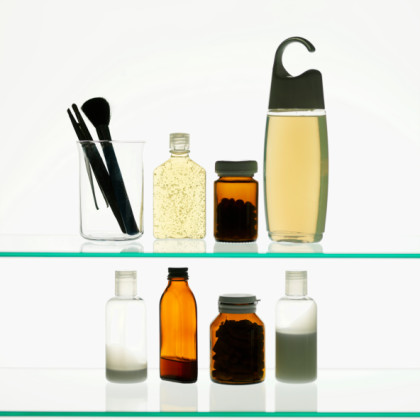Tina Rodia sells health and beauty products to equal parts men and women.
The longstanding gender stereotype that men are blind to their own measure of grooming and healthy discipline, or lack thereof, is both true and false. The same goes for the stereotype of the over-preening, hypercritical woman drowning in products and the compulsion to address the inevitable ravages (or softening) of time on the body. There is a line that separates hypochondriacs from those ambivalent about health, and a line that separates the product-obsessed and the product-averse. That line is not gendered.
In the 12 years I have sold vitamins and beauty care products to San Franciscans, all assumptions about men and women and the degree to which they care for their health and beauty have been challenged to death, and replaced by a spectrum. At one end are the skeptics, wary of the efficacy of any herbal remedy, ointment, goo, or unction that promises healing. They are even skeptical of their own symptoms, the type that would never consider going to a doctor unless dragged unconscious, or if a tooth falls from their mouth.
These are not just men, however. I’ve seen sun-ravaged women who swear that moisturizer or eye cream doesn’t work, who have never put on sunscreen in their life. Smokers whose mouths have turned ash-grey, men and women alike, who have bought nothing more from the drugstore than a box of bandages in 20 years. Further along the spectrum are the skeptical who, due to recent surprises or health scares, reluctantly turn to remedies out of desperation, or to satisfy the urging of their spouses or children. Baby Boomers suddenly, for the first time in their lives, find themselves in a health food store asking for Saw Palmetto, pumpkin seeds, or arthritis cream.
While many men don’t have to face certain age-related health issues, all aging women get to experience the joys of menopause. It is unavoidable, and while hormone replacement therapy is commonly prescribed, some women further along the spectrum seek out alternatives, like wild yam and estrogen creams. While it still remains true that fewer men come in seeking a night cream in particular (more are likely to ask for a body lotion that they can just “put all over”), women grow more serious about the exact function of their miracle beauty creams when staring at the mirror every morning, greeted by time-addled skin.
The same can be argued for proactive health choices and checkups, and being coupled may increase the suggestion of more self-care, but not exactly the follow-through. My boyfriend (who took a four-year respite from visiting a dentist out of sheer apathy) blinks curiously at me when I explain that the face soap in the shower is much more nuanced than the one bar of soap he uses as his general all-over cleansing tool. To him, skin is one seamless dermal layer. My face, I argue, is an entirely separate ecosystem, and one that is aging quickly.
Aging is a graceful process only for those at the extreme end of the spectrum, and that is one expensive spectrum. It is not an exclusively vain spectrum: One can argue that protecting skin with sunscreen, essential fatty acids, and alpha-hydroxy peels keeps the dermal organ youthful not for vanity, but for overall health. But the primary motivation is usually vanity, although the popular terminology is “health-conscious.”
These men and women are more likely to spend good money to cleanse their insides, maintain pristine levels of healthy flora, immunoboosters, digestive enzymes, brain tonics, and adrenal health tonics. And why wouldn’t you? Who wouldn’t want to age gracefully, and, more importantly, painlessly? Certainly not just women. We all take inventory of our flaws and maladies with the same measure of self-criticism I believe. It is where we fall individually on the spectrum, somewhere between addressing every flaw and twinge to ignoring all symptoms and imperfections, that defines our level of self-care.
I sell far more hair styling products to well-coiffed men, yet more conditioner to long-locked women. Both men and women prefer one-a-day multivitamins, yet more women are easily swayed by Dr. Oz’s latest weight-loss miracle cure. Men always want the “smoothest” shave cream, women always want the eye cream that “really works.” Granted, some men I know are cultivating a healthy trimester-like beer belly and haven’t used a face cream in, well, ever. But several women I know can’t be bothered either.
Tina Rodia is a freelance writer and small business owner in San Francisco. She grew up in Connecticut, and has a B.A. in creative writing and women’s studies.
Related Links:

